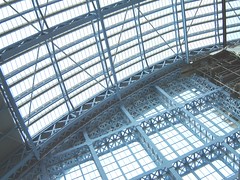
roof4
To add to the discussion on digital literacy initiated here and continued on Dr Joolz, I wanted to set out the view that for me the focus (or definition) of the term is reading-with and writing-with new technologies - technologies which involve the semiotic of lettered representation, alongside other forms of representation. In this sense digital literacy extends out of print literacy despite the fact that the processes, tools, surfaces and spaces of production and consumption are different. So the common ground is alphabetic writing and this I believe, is helpful and important, particularly to educational and developmental debates. However, when we consider the texts and contexts in which digital literacy is located there is a much larger shift of emphasis. These could be categorised in the following ways:
1. A move from the fixed to the fluid: the text is no longer contained between the covers or by the limits of the page.
2. Texts become interwoven in more complex ways through the use of hyperlinks.
3. Texts are revised, updated, added to and appended (and often archived).
4. Genres borrow freely, hybridize and mutate.
5. Texts become collaborative and multivocal with replies, links, posted comments and borrowing.
6. Reading and writing paths are non-linear, knowledge and information structures are rhyzomic.
7. Texts become more densely multimodal (as multimedia allows for a rich interplay of modes).
8. Roles of readers and writers overlap.
9. Textual interaction and collaboration often result in shared authorship.
10. The communicative space is shared as the local fuses with the global.
11. The impression of co-presence and synchronous engagement increases.
12. Boundaries begin to blur (work/leisure; public/private; serious/frivolous)
So the transformation is in terms of new possibilities for texts, easier combinations of semiotic systems, new communicative relationships and some other things about speed, publication and audience. But we should be able to ask, without the danger of being branded as a conservative, how far we could get with new literacies - or to be more specific technoliteracies – without alphabetic literacy.
No comments:
Post a Comment